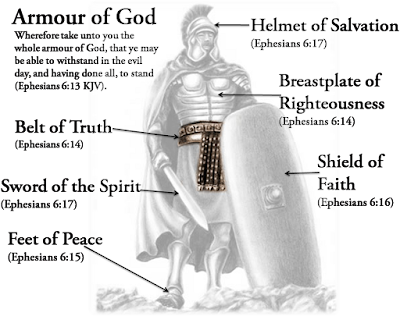Bishop Jack brings the propers together today. His sermon is below the propers and can be viewed on video HERE -> https://youtu.be/F8GsTwo-gTo
In the Collect, we ask God to pardon our sins so we might serve Him with peace of mind and do His Work without having to worry about our fate. It is good to have a clear mind when you go into battle, to be free of worry that you might do your best. In his letter tpo the people of Ephesus, Paul gives his clearest definition of the spiritual war between the forces of Satan and those who would follow God. It not only assures us that there is a spiritual war, but it warns us that apart from utilizing the weapons which God has provided for us, we are hopelessly underpowered. The Gospel talks about the need for persistence; a very important part of the Christian life, it helps build our character in bad times, and also in good as well. It all comes together, read or listen and find out how. I hope you find it useful.
The Propers for today are found on Page 218-220, with the Collect first:
Twenty-First Sunday after Trinity
The Collect.
RANT, we beseech thee, merciful Lord, to thy faithful people pardon and peace, that they may be cleansed from all their sins, and serve thee with a quiet mind; through Jesus Christ our Lord. Amen.
The Epistle for this morning came from Saint Paul’s Letter to the Ephesians, the Sixth Chapter, beginning at the Tenth Verse. In these passages, Paul gives his clearest definition of the spiritual war between the forces of Satan and those who would follow God. It not only assures us that there is a spiritual war, but it warns us that apart from utilizing the weapons which God has provided for us, we are hopelessly underpowered. This passage tells us what our divine weapons are. Beyond this, these weapons imply the nature of the struggle which we are in. The weapons which God has provided for us are those weapons which best repel the attacks of Satan, and thus we can learn a great deal about the nature of Satan’s opposition from simply considering each of the weapons at our disposal.
After a consideration of the war in general, we will then proceed to examine in more detail each of the weapons Paul mentions, and the offensive strategy of Satan which they imply. May God give us open hearts and minds to understand the spiritual war, and the means which He has provided for our defense.
Y brethren, be strong in the Lord, and in the power of his might. Put on the whole armour of God, that ye may be able to stand against the wiles of the devil. For we wrestle not against flesh and blood, but against principalities, against powers, against the rulers of the darkness of this world, against spiritual wickedness in high places. Wherefore take unto you the whole armour of God, that ye may be able to withstand in the evil day, and having done all, to stand. Stand therefore, having your loins girt about with truth, and having on the breastplate of righteousness; and your feet shod with the preparation of the gospel of peace; above all, taking the shield of faith, wherewith ye shall be able to quench all the fiery darts of the wicked. And take the helmet of salvation, and the sword of the Spirit, which is the word of God: praying always with all prayer and supplication in the Spirit, and watching thereunto with all perseverance and supplication for all saints; and for me, that utterance may be given unto me, that I may open my mouth boldly, to make known the mystery of the gospel, for which I am an ambassador in bonds: that therein I may speak boldly, as I ought to speak.
The Holy Gospel came from the Fourth Chapter of the Gospel according to St. John beginning at the Forty-Sixth Verse. This is a telling of the story of the healing of a Jewish nobleman's son Capernaum through the faith of his father. When the man came to him asking for help, he responded as he often did to Jews, “Except ye see signs and wonders, ye will not believe.” The man persisted and because Jesus saw faith in him, he said, focusing his attention on faith in God, “Go thy way; thy son liveth” or "Be on your way. Your son is alive." In other words: "Do not worry. My Word can heal your son at a distance." The boy was healed in the very instant when Jesus spoke the Word. The father believed this Word. So did his household, wife, children and servants. More than one person was healed on that occasion.
This miracle shares characteristics with the previous healing of the Centurion’s son:
- Jesus has just come back to Galilee.
- Someone comes to him with a request.
- Indirectly Jesus seems to refuse at first.
- The person persists.
- Jesus grants the request.
- This leads another group of people (his disciples, the nobleman’s household) to believe in him.
Note the necessity of trusting in Jesus as the giver of life. Of the text, Luther wrote: "Although the Lord performed miracles and signs to make Himself known and to lead people to faith in Him, the underlying purpose was to focus their attention on the Word rather than on the signs which served merely to attest the truth of His testimony. Faith must rest on the Word of God." Another Lutheran theologian wrote: "In affliction faith is practiced and chastened. If a person does not see, taste and experience the help and grace of the Lord, then that person learns to trust the Word and nothing but the Word. That is the true faith, trusting the Lord for its own sake. Such faith comes not from flesh and blood. It's the Lord to which faith clings. That almighty Word works faith."
Jesus led this nobleman from a "miracle" faith to a true faith in His Word. He does this to us also.
"Be on your way. Your son lives." This Word of Jesus was not only a prophecy. It had the power to heal the sick boy. And this Word took the nobleman's worries away.
HERE was a certain nobleman, whose son was sick at Capernaum. When he heard that Jesus was come out of Judæa into Galilee, he went unto him, and besought him that he would come down, and heal his son: for he was at the point of death. Then said Jesus unto him, Except ye see signs and wonders, ye will not believe. The nobleman saith unto him, Sir, come down ere my child die. Jesus saith unto him, Go thy way; thy son liveth. And the man believed the word that Jesus had spoken unto him, and he went his way. And as he was now going down, his servants met him, and told him, saying, Thy son liveth. Then enquired he of them the hour when he began to amend. And they said unto him, Yesterday at the seventh hour the fever left him. So the father knew that it was at the same hour, in the which Jesus said unto him, Thy son liveth: and himself believed, and his whole house. This is again the second miracle that Jesus did, when he was come out of Judæa into Galilee.
Sermon - Bishop Jack Arnold
Anglican Orthodox Church of the United States
Diocese of the West
Church of the Faithful Centurion - Descanso, California
Bp Jack brings the Propers together today and can be viewed on video here -> https://youtu.be/STLJ3NI7128
Today’s sermon tied the Collect, Epistle and Gospel together and talked, as is oft the case, of the need for action, not simply diction.
Consider these words from the Collect:
… Grant … thy faithful people pardon and peace, that they may be cleansed from all their sins, and serve thee with a quiet mind …
We ask God to pardon our sins so we might serve Him with peace of mind and do His Work without having to worry about our fate. It is good to have a clear mind when you go into battle, to be free of worry that you might do your best. You do not want a foggy mind while performing an action that requires your best concentration, so that is what we are asking from Him. To give us clarity of mind that we might do what is right.
We need His pardon and peace to cleanse us from our sins, to enable us to have a mind that is quiet and focused on doing His will. With all the horrible things that go on this world daily, we are in need of a quiet mind. In order to serve Him well during all of these trials and tribulations that occur during our lives, it is a requirement that we have a quiet and focused mind. In order to have the quiet and focused mind, we need to ask Him to send the Holy Ghost into our hearts, souls and minds that we might have the quietness and focus we need instilled in our minds to do the tasks that He gives us.
When we mention peace, it is a very different concept from what people in this world think of it. The world’s idea of peace seems to ebb and flow with the ages and their concept of peace differs radically from what God’s peace is. They do not have the constant, unyielding, unchanging standard of God to follow so they are all over the place. The peace God gives us is the calmness and stability in our soul when the world is crumbling around or even on us. While the world is flailing about every which way we are secure in the knowledge we are following the ultimate form of goodness, God Himself. It is the surety that no matter what happens this life, as long as we do what God asks, our souls will be safe in the next life. This will give us a calm of mind that the world is incapable of giving as they do not know the peace of God and the Holy Spirit.
It is that peace of mind and soul that comes from knowing when we die, we will be with God and Jesus and enjoying eternity with them. It helps us to know this is only a transitory phase. This is only temporary way point on our way to heaven. And if we let it, this peace will take the place of worry. This can be easier said than done, but if we let the Holy Ghost into our hearts, we will find our worries will disappear quickly. The peace gives you the confidence to perform actions, even in difficult and very trying circumstances. Once again, action, not diction, is paramount.
Not everyone will accept it though, even though all should accept the offered gift, it does not mean they will. And those that do accept may not accept right away. It may take time for the seed of the Holy Ghost to germinate and bear fruit in the hearts of some of the more worldly people. As our fallen nature attests, we are not instantly transformed into a different person overnight, but rather thorough many days, weeks and years of practicing Christian beliefs, through reading Scripture and being around other believers. The transformation happens in a gradual process, that continues all of our lives. With some of the non-believers we encounter in our live this might occur, the seed we plant may germinate in time to bring them to Christ.
Paul gives his clearest definition of the spiritual war between the forces of Satan and those who would follow God. It not only assures us that there is a spiritual war, but it warns us that apart from utilizing the weapons which God has provided for us, we are hopelessly underpowered. He also clearly identifies that our enemies will not just be acting within the spiritual realm , they will be also acting in this world in high positions and places and poised to make our lives difficult. This passage tells us what our divine weapons are. Now that we know our weapons and the nature of this spiritual battle, what are we to do? We are clearly commanded to take an offensive role, to go where the battle is. We are not called to be at the rear, but on the front lines, in this spiritual battle. With the help of the Holy Ghost, we should be using our tongues boldly as St. Paul says, to spread the Gospel. Being bold does not mean we are to be rude or cruelly shouting down the opposition in preaching the Gospel, but it does not mean we are to be timid about it. We must preach it with the great conviction that the Holy Ghost will provide us if we will let Him In.
In order to boldly preach the truth of the Gospel throughout the world, we must not worry ourselves with what the world will think. For what the world will think is not as important as what God thinks. We will do our actions and say the truth with clarity and confidence. That is what it means to preach the Word boldly.
The Word spreads “by word of mouth” and by action. It does not spread by mouth alone! There needs to be work backing up those good words. Your mouth, your actions!
Speaking of actions, Winston Churchill said, “Never give in--never, never, never, never, in nothing great or small, large or petty, never give in except to convictions of honour and good sense. Never yield to force; never yield to the apparently overwhelming might of the enemy.”
Churchill was not the first. God wants us to persist. Consider the case of the nobleman of Capernaum. The man asked Jesus for help for his son. Jesus did not immediately grant the request as He needed the man to persist to make a point for those around him. He responded as he often did to Jews, Except ye see signs and wonders, ye will not believe. The man persisted and because Jesus saw faith in him, he said, focusing his attention on faith in God, Go thy way; thy son liveth or "Be on your way. Your son is alive." In other words: "Do not worry. My Word will heal your son no matter the distance." The boy was healed in the very instant when Jesus spoke the Word. The father believed this Word. So did his household, wife, children and servants. More than one person was healed on that occasion.
This miracle shares characteristics with the previous healing of the Centurion’s son:
- Jesus has just come back to Galilee.
- Someone comes to him with a request.
- Indirectly Jesus seems to refuse at first.
- The person persists.
- Jesus grants the request.
- This leads another group of people (his disciples, the nobleman’s household) to believe in him.
Note the necessity of trusting in Jesus as the giver of life. Jesus led this nobleman from a "miracle" faith to a true faith in His Word. He does this to us also, but only if we will let Him into our hearts and guide us there.
"Be on your way. Your son lives." This Word of Jesus was not only a prophecy. It had the power to heal the sick boy. And this Word took the nobleman's worries away. As it will take ours away if we will let it.
As we see in the Gospel, persistence is a very important part of the Christian life, it helps build our character in bad times, and also in good as well. Persistence is what fuels us in our day to day physical and spiritual lives. Persistence is a very important character trait to have as a Christian. Persistence is what fuels us through times of trial and tribulation and helps give us the strength to carry on when all seems lost here on Earth. For we know not all is lost for in the end we know God wins. With this knowledge we can persist and do our part to improve our corner of the world. The more we open ourselves up to Him, the more persistent we will become as we embody more and more of His characteristics. Persistence will help us greatly in our character development and will help strengthen us spiritually.
Consider also that God, through our Lord, offers forgiveness. Forgiveness lets you restart your life, regain your foothold, strengthen your soul. If you accept the forgiveness and go forward you can do great things. If you will not, and likewise you will not forgive, you will be bound by the prince of this world and doomed to failure. You will never attain the greatness of which you are capable with God’s grace and help.
Do what is right, I would say no matter if there is no one looking; but He is always looking. It is not that hard. Believe, take His help, act on the belief you profess, never ever give up.
Heaven is at the end of an uphill trail. The easy downhill trail does not lead to the summit.
The time is now, not tomorrow. The time has come, indeed. How will you ACT?
The time to act is NOW. Will you act? For whom will you act? Will you count the cost before you act?
Action, not diction, is what counts. It is by your actions you are known.
Be of God - Live of God - Act of God
Sir Winston Churchill, Speech, 1941, Harrow School







